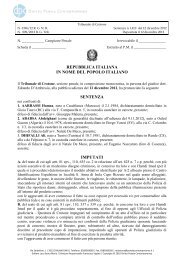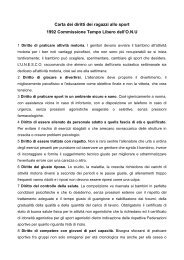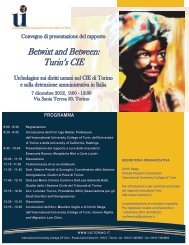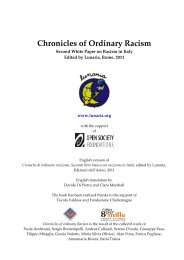Chronicles of ordinary racism 2011 - Cronache di ordinario razzismo
Chronicles of ordinary racism 2011 - Cronache di ordinario razzismo
Chronicles of ordinary racism 2011 - Cronache di ordinario razzismo
- No tags were found...
Create successful ePaper yourself
Turn your PDF publications into a flip-book with our unique Google optimized e-Paper software.
This ruling reaffirmed the principle <strong>of</strong> equal treatment in the access to social services for<br />
Italian citizens and long‐term EU residents introduced by art. 11 <strong>of</strong> <strong>di</strong>rective<br />
2003/109/CE, implemented by Decree n.3/07 which mo<strong>di</strong>fied art. 9 <strong>of</strong> the Consolidated<br />
Law on Immigration.<br />
The problem stemmed from the fact that aforementioned art. 11 allows Member States<br />
to limit equality <strong>of</strong> treatment exclusively to the delivery <strong>of</strong> essential services. Thus the<br />
question was whether or not Italy had availed itself <strong>of</strong> this particular waiver.<br />
The answer delivered by the Gorizia Court appears fairly straightforward: as the<br />
implementation <strong>of</strong> the ruling had not operated any <strong>di</strong>stinction between the <strong>di</strong>fferent<br />
services to be granted or denied to long‐term EU residents, Italy had chosen not to avail<br />
itself <strong>of</strong> the waiver. Nor it is possible to interpret the phrase “unless otherwise<br />
determined” contained in art. 9, Consolidated Law on Immigration, as referring to any<br />
law issued prior to this ruling that (as in the case <strong>of</strong> support to large families ex art. 65,<br />
Law 448/1998) excluded foreigners as a whole from accessing certain benefits and was<br />
therefore passed without taking into account the principle <strong>of</strong> equality prescribed by EU<br />
legislation for a specific group <strong>of</strong> foreigners.<br />
Hence the expression cannot but refer to regulations introduced in order to implement<br />
the <strong>di</strong>rective, or (at any rate) subsequent to its implementation, when national<br />
legislation assessed whether or not the exception could meet the standards set by the<br />
EU.. 207<br />
The decree on “holiday vouchers”<br />
Another episode which falls within the category <strong>of</strong> the availability <strong>of</strong> social services and<br />
which received a certain amount <strong>of</strong> me<strong>di</strong>a coverage, is that <strong>of</strong> so‐called “holiday<br />
vouchers” (not strictly a social service but aimed nevertheless at poorer sections <strong>of</strong><br />
society).<br />
This affair centered on the institution by Ministerial decree, on 21 October 2008, on the<br />
part <strong>of</strong> the then‐Cabinet undersecretary hol<strong>di</strong>ng the tourism portfolio (now Minister for<br />
tourism) <strong>of</strong> a holiday grant to “to be used to fund acts <strong>of</strong> solidarity towards the more<br />
<strong>di</strong>sadvantaged sections <strong>of</strong> the population” (cf. art. 1 <strong>of</strong> the 21 October 2008 decree).<br />
This grant consisted (and still consists) in the introduction <strong>of</strong> a percentage <strong>di</strong>scount on<br />
the value <strong>of</strong> the requested holiday vouchers – which can be redeemed in specific<br />
accommodation taking part in the scheme ‐ up to a maximum amount linked to the<br />
number <strong>of</strong> family members. The Official Gazette <strong>of</strong> 25 November 2009 then published<br />
the decree, which listed Italian citizenship among the qualifications necessary to obtain<br />
these vouchers. Two appeals were submitted to the Brescia and Milan Courts to contest<br />
this ruling.<br />
and social assistance. Inps, inexplicably, <strong>di</strong>d not make the same arrangement for citizens hol<strong>di</strong>ng a long-term EU<br />
residence permit.<br />
207 The application <strong>of</strong> the principle <strong>of</strong> equality to long-term residents constitutes the most resoun<strong>di</strong>ng pro<strong>of</strong> <strong>of</strong> the<br />
degree <strong>of</strong> irrationality that can be reached by such a <strong>di</strong>sorderly system: long-term residents can claim equality in<br />
light <strong>of</strong> <strong>di</strong>rective 2003/109, but once the contributions have been extended to long-term residents, the foreigners who<br />
see themselves cut <strong>of</strong>f from them can assert the principle stated by the rulings <strong>of</strong> the Constitutional Court 306/08,<br />
11/09 and 187/10 that automatically bypass the requisite <strong>of</strong> a residence permit at least as far as income and housing<br />
are concerned.<br />
Thus this particular service broadens its reach, but only by repeatedly knocking down barriers in a process that<br />
should be more logically regulated by means <strong>of</strong> an adequate legislation or by simply a reverting to those principles<br />
stated in art. 41 <strong>of</strong> the Consolidated Law on Immigration.<br />
84










